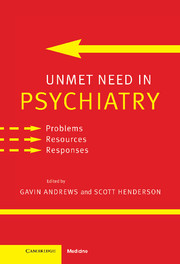Book contents
- Frontmatter
- Contents
- List of Contributors
- Preface
- Part I Unmet need: defining the problem
- Part II Unmet need: general problems and solutions
- Part III Unmet need: people with specific disorders
- Introduction
- 13 The unmet needs of people suffering from schizophrenia
- 14 The early course of schizophrenia: new concepts for early intervention
- 15 Unmet need in depression: varying perspectives on need
- 16 Unmet need following serious suicide attempt: follow-up of 302 individuals for 30 months
- 17 Met and unmet need for interventions in community cases with anxiety disorders
- 18 The unmet need for treatment in panic disorder and social phobia
- 19 Alcohol-use disorders: who should be treated and how?
- 20 Putting epidemiology and public health in needs assessment: drug dependence and beyond
- 21 Why are somatoform disorders so poorly recognized and treated?
- Part IV Unmet need: specific issues
- Part V Unmet need: conclusion
- Index
Introduction
from Part III - Unmet need: people with specific disorders
Published online by Cambridge University Press: 21 August 2009
- Frontmatter
- Contents
- List of Contributors
- Preface
- Part I Unmet need: defining the problem
- Part II Unmet need: general problems and solutions
- Part III Unmet need: people with specific disorders
- Introduction
- 13 The unmet needs of people suffering from schizophrenia
- 14 The early course of schizophrenia: new concepts for early intervention
- 15 Unmet need in depression: varying perspectives on need
- 16 Unmet need following serious suicide attempt: follow-up of 302 individuals for 30 months
- 17 Met and unmet need for interventions in community cases with anxiety disorders
- 18 The unmet need for treatment in panic disorder and social phobia
- 19 Alcohol-use disorders: who should be treated and how?
- 20 Putting epidemiology and public health in needs assessment: drug dependence and beyond
- 21 Why are somatoform disorders so poorly recognized and treated?
- Part IV Unmet need: specific issues
- Part V Unmet need: conclusion
- Index
Summary
This is a good section, no more generalizing, ‘just let me tell you how it is with the people I treat'. Sadly we have no contribution from psychogeriatricians and Dr Patel is the only representative of the developing world. We sought for people who would tell us how to serve multitudes with very small budgets. We asked too much. A doctor in a poor country needs someone to take over the clinical load and to provide research and secretarial assistance if they are to have time to prepare material for a book like this. We refer readers to Goldberg & Thornicroft (1998) for they managed to get papers from 11 countries, not all affluent by any means, that describe services in 11 cities.
It is pleasing therefore that the first chapter in this section is by Thornicroft and his group on the unmet need of people with schizophrenia (Chapter 13). Their definitions bear remembering: need is what people could benefit from; demand is what people ask for; and supply is what is provided. They distinguish between need at the personal and service-delivery levels, and they give many examples using different instruments and different studies. The Häfner and Maurer chapter (Chapter 14) takes quite a different approach to reducing unmet need: identify people before their first psychotic break and supply them with the best treatment. If you read nothing else in their chapter you should read their conclusions. Wilhelm and Lin (Chapter 15) also see prevention as vital to the management of depression.
- Type
- Chapter
- Information
- Unmet Need in PsychiatryProblems, Resources, Responses, pp. 195 - 196Publisher: Cambridge University PressPrint publication year: 2000

